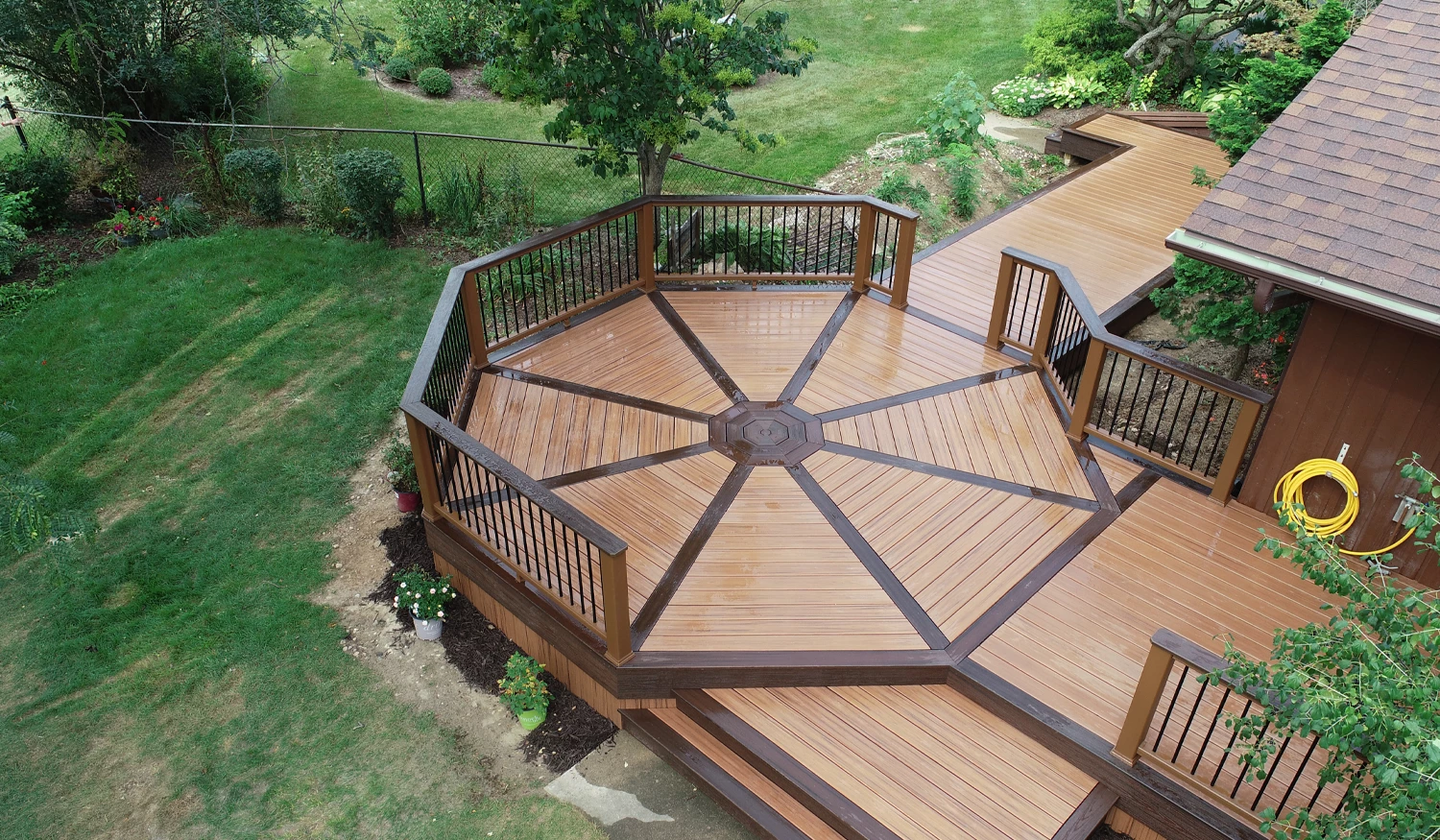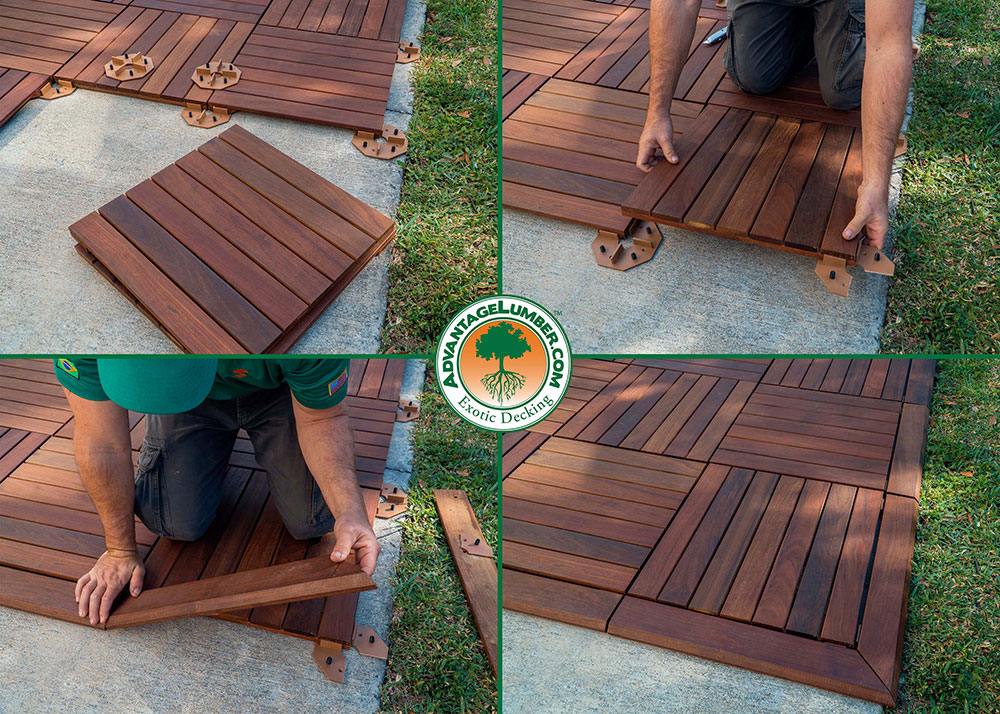How to Choose the Right Materials for Your Deck Setup Task
Choosing the ideal products for your deck installation project can appear difficult. There are numerous factors to think about, from durability and maintenance to aesthetic appeals and ecological influence. The option between traditional wood and composite materials, each with its own set of advantages and disadvantages, can be especially difficult. The trick is to stabilize your spending plan, design choices, and way of life needs to create a deck that will certainly enhance your outdoor area for many years to find.
Comprehending the Different Kinds Of Deck Products
When getting started on a deck installation project, the choice of products comes to be an essential decision. Compound products, on the various other hand, are a blend of wood and plastic, supplying sturdiness and resistance to weather components. By comprehending these distinctions, home owners can make a more educated decision on the most appropriate deck material for their particular needs.
Assessing the Sturdiness and Maintenance Demands of Deck Materials
Analyzing the toughness and upkeep needs of deck materials is a crucial action in deck setup. Sturdiness involves the product's capability to stand up to severe weather problems, wear and tear, and its durability.
Understanding upkeep demands is equally important. Some products require regular securing or staining to keep their look and resist dampness damage, while others, like composite outdoor decking, require less upkeep. By evaluating these variables, one can select one of the most appropriate decking product, guaranteeing an equilibrium between resilience, upkeep requirements, and visual appeal.
Price Analysis: Contrasting Wood and Compound Decking
Although expense might at first feel like a second worry, it is a considerable aspect when comparing timber and composite outdoor decking. Wood, generally a cheaper choice, has a reduced ahead of time cost. Nevertheless, with time, maintenance costs can accumulate, potentially making timber more costly in the lengthy run. These maintenance prices might include staining, sealing, or replacing harmed boards. On the various other hand, composite outdoor decking, while pricier at first, needs much less upkeep, possibly reducing long-lasting expenses. Yet, it's essential to bear in mind that composite decking isn't unsusceptible damage, and substitute expenses can be high. Consequently, prospective deck owners must consider their budget and desire to preserve their decks when determining between wood and composite decking.
Visual Appeals and Layout Adaptability of Decking Materials
All-natural timber outdoor decking gives a timeless, classic look, while composite products offer a broad array of colors and textures to suit diverse preferences and designs. Compound products, while less adaptable in design, are still versatile sufficient for a lot of deck layouts. These variables, therefore, are vital factors in the selection of decking product.
Environmental Influence of Decking Materials
When picking outdoor decking products, one have to take into consideration not only looks and toughness, yet likewise the environmental impact. It is necessary to examine the sustainability of products and explore recycled decking options. Moreover, understanding the potential effect on neighborhood ecosystems will guarantee an extra ecologically accountable option.
Examining Product Sustainability
In the world of deck building and construction, assessing material sustainability is a vital action. Composite outdoor decking products typically integrate timber and plastic, reducing the need for brand-new wood but increasing reliance on fossil additional info fuels - deck installation austin. Hence, the option of decking materials ought to balance functionality, visual appeals, price, and over here sustainability to make certain a responsible and durable installment.
Recycled Outdoor Decking Alternatives

Compound decking is particularly prominent as a result of its resilience and simplicity of upkeep. It's immune to rot, insects, and fading, making it a lasting choice. Recycled plastic outdoor decking, on the various other hand, is highly resilient and requires minimal upkeep. While these materials may bring a greater first price, their longevity and reduced environmental impact make them a sensible investment for the eco-conscious property owner.

Effect On Local Environments
While the advantages of utilizing recycled materials for decking can not be overemphasized, it's equally crucial to consider the wider ecological implications of these options. The useful source removal, processing, and transport of products can greatly impact regional ecological communities. Logging for hardwood decking adds to habitat loss and climate change. Even the manufacturing of composite products can release unsafe emissions. On the other hand, making use of recycled or sustainably sourced materials can help minimize these results. Additionally, taking into consideration the life-span of materials can decrease environmental impact; longer-lasting choices call for much less constant substitute, thus saving resources. Appropriate disposal of old decking is important to reducing landfill waste. Essentially, an eco-conscious deck task demands cautious material option, lasting sourcing, and accountable disposal.
Making Your Last Choice: Tips for Choosing the very best Deck Materials
As the article changes into the subtopic of "Making Your Final Choice: Tips for Choosing the Finest Deck Materials", it is crucial to understand the range of deck materials offered. Striking a balance in between longevity and aesthetics is crucial in this choice procedure. The adhering to conversation will lead visitors in making an educated choice based upon these essential factors to consider.
Comprehending Various Deck Materials
The task of choosing the ideal products for your deck setup can seem intimidating as a result of the large selection of choices readily available. However, comprehending the various products can streamline this process. Timber is a popular option, using a timeless visual and cost. Kinds of wood made use of consist of pressure-treated lumber, cedar, and redwood. Composite products, made from a blend of wood and plastic, are low-maintenance and immune to rot and pests. Plastic or PVC decks are even a lot more durable and require less maintenance than composite materials, but they can look much less natural. Last but not least, light weight aluminum decks are solid, light-weight, and immune to rot, yet they are additionally the most expensive choice. Each material has its very own advantages and downsides, making it critical to consider your details demands prior to making a last decision.
Resilience vs. Looks Equilibrium
Balancing durability with appearances can be a difficulty when picking deck materials - deck installation near me. High-traffic locations might necessitate resilient products like composite outdoor decking, which holds up against wear and tear but may do not have the all-natural elegance of wood. Property owners need to strike an equilibrium, taking into consideration both the deck's practical needs and their visual choices.
Verdict
To conclude, selecting the appropriate materials for your deck setup job requires careful factor to consider of variables such as durability, maintenance, expense, looks, and environmental influence. Whether you select traditional wood or composite materials, your choice ought to align with your spending plan, style preferences, and way of living. Eventually, the most effective outdoor decking material is one that enhances your exterior room and provides satisfaction for many years to come.